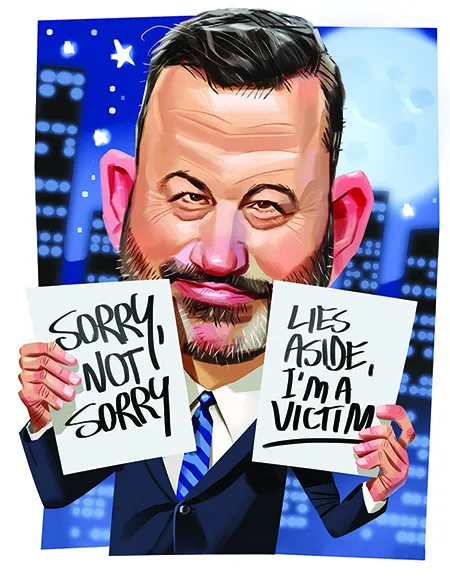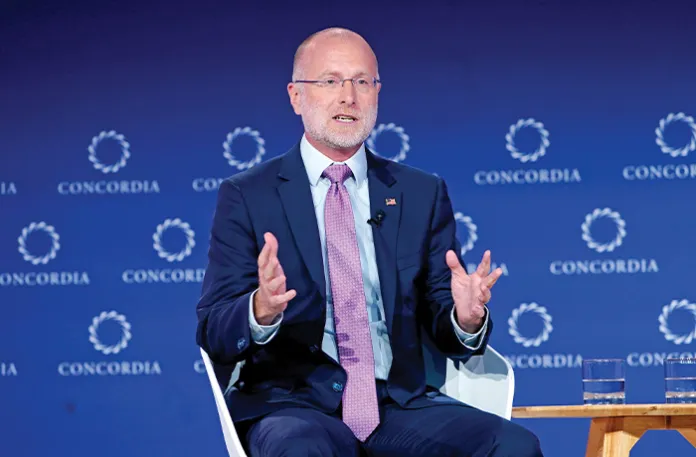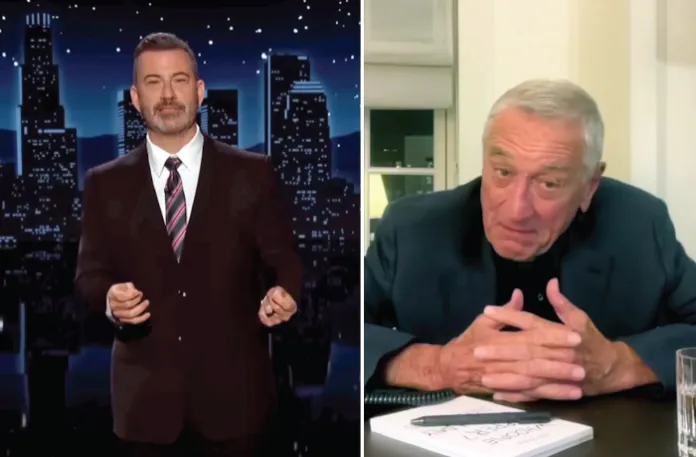


When Jimmy Kimmel returned to the stage of Jimmy Kimmel Live! after a weeklong suspension that rocked Hollywood and sparked a national firestorm, the audience’s cheers were thunderous. The defiant host directly confronted Federal Communications Commission Chairman Brendan Carr, whom he lampooned in a biting sketch featuring Robert De Niro as a mob-style censor.
Recommended Stories
- Dan Brown’s conspiracy of cuccess
- Spinal Tapped out: Review of 'Spinal Tap II'
- Robert Redford, 1936-2025
“Every night they’ve defended my right to poke fun at our leaders and to advocate for subjects that I think are important,” Kimmel declared. “What is important is that we get to live in a country that allows us to have a show like this.” The De Niro bit, dripping with Goodfellas-inspired bravado, had the crowd roaring, but its message was unmistakable: Kimmel views his suspension as chilling government overreach, a warning to anyone who dares to speak freely in an era of heightened political tension. The sketch, with De Niro’s Carr showing what it would be like if Tony Soprano ran the FCC (I would watch that show!), was intended as a stark reminder of the stakes.
The suspension traced back to Kimmel’s Sept. 15 monologue, in which he suggested that the “MAGA gang” was dodging responsibility for the 22-year-old accused of assassinating the conservative political activist Charlie Kirk. Kimmel’s claim that the shooter was “one of them,” as in MAGA, unleashed a torrent of backlash, with conservatives accusing him of peddling dangerous misinformation. Despite Kimmel’s return, dozens of ABC affiliates, led by Nexstar and Sinclair, continue to preempt his show, branding his remarks “offensive and insensitive.” Kimmel’s comeback has reignited fierce debates about the boundaries of acceptable speech in a time of political violence, the government’s murky influence over media, and late-night television’s role in our politics and culture.

Kimmel’s key quote from the controversial monologue that started it all: “We hit some new lows over the weekend with the MAGA gang desperately trying to characterize this kid who murdered Charlie Kirk as anything other than one of them, and doing everything they can to score political points from it.” He doubled down with a jab at President Donald Trump’s response to Kirk’s death, likening it to “a 4-year-old mourning a goldfish.” The remarks landed like a grenade, especially as Utah prosecutors later revealed the shooter’s leftist leanings, including his vocal support for gay and trans rights on social media. Megyn Kelly described Kimmel’s words as a “vile, disgusting lie” and accused him of inflaming an already volatile situation.
Nexstar Media Group, which operates 32 ABC affiliates, announced it would preempt Jimmy Kimmel Live! for the foreseeable future, while Sinclair Broadcast Group planned a tribute to Kirk in Kimmel’s slot. Both companies faced accusations of bowing to political pressure to curry favor with the Trump administration. Carr amplified the outrage when he appeared on Benny Johnson’s podcast to call Kimmel’s comments “the sickest conduct possible” and hinted at license revocations for ABC affiliates. “We can do this the easy way or the hard way,” Carr said, a line critics likened to the mob. On Sept. 17, Disney-owned ABC suspended the show. After a week of negotiations, Disney reinstated Kimmel, betting on his star power to salvage the show, but the damage to his brand and the network lingers.
Kimmel’s return was a calculated act of defiance. His monologue tackled the suspension head-on: “I was not happy when they pulled me off the air on Wednesday. I did not agree with that decision, and I told them that.” Kimmel framed his return as a stand for free speech: “Our freedom to speak is what [other countries] admire most about this country.”
Though Kimmel was back on the air, he wasn’t back on all ABC affiliates. Nexstar and Sinclair, which control roughly 10% of ABC’s reach, refused to air the episode, citing Kimmel’s lack of “professionalism and accountability.” Sinclair demanded a public apology to Kirk’s family and a donation to Turning Point USA, conditions Kimmel has pointedly ignored. Protests outside Disney’s Burbank headquarters and Kimmel’s Hollywood studio, with signs reading “Don’t Bend to Trump” and “Cancel Disney+,” reflected the Left’s outrage, but the ongoing affiliate boycotts signal a fractured audience. Some stations have replaced Kimmel’s slot with reruns of Modern Family, a move that underscores the depth of the divide and raises questions about whether his return can fully restore his show’s reach.

Kimmel wasn’t the only one to face consequences for comments about Kirk’s death. MSNBC fired analyst Matthew Dowd for suggesting that Kirk’s rhetoric incited violence. The Washington Post dropped columnist Karen Attiah for highlighting “racial double standards” in social media reactions to the killing, though she was accused of misquoting Kirk in the process. Hashtags like #SaveKimmel and #ResistFascism trended on social media, but Kirk’s name was conspicuously absent from much of the discourse. “Where was this outrage when Charlie was murdered?” comedian Jeff Dye asked, capturing conservatives’ frustration over what they saw as skewed priorities — grieving a talk show’s hiatus more than a young activist’s life. Hollywood rallied behind Kimmel, with over 400 stars, including Tom Hanks, Meryl Streep, and De Niro, signing an American Civil Liberties Union letter calling the suspension a “dark moment for freedom of speech.”
Late-night hosts Jon Stewart, Jimmy Fallon, and Seth Meyers voiced solidarity, with Stewart labeling it “blatant censorship” on The Daily Show. But Fox News’s Greg Gutfeld offered a counterpoint, noting that Kimmel and many of his defenders had previously cheered the silencing of conservative voices such as Roseanne Barr and Tucker Carlson. “The only way they’ll stop is if it happens to them,” Gutfeld said, exposing the hypocrisy. Tragedy is now politically polarizing rather than a moment for collective mourning.
The president had celebrated Kimmel’s suspension as a personal and national triumph. “Great News for America,” he posted on Truth Social, urging NBC to cancel Fallon and Meyers next. Donald Trump Jr. framed it as “Consequence Culture,” not cancel culture, pointing to Kimmel’s dismal ratings. Dave Portnoy echoed this: “You say something offensive, you face consequences. That’s business, not censorship.” But Sen. Ted Cruz (R-TX) sounded a note of caution, comparing Carr’s tactics to a “mafioso shakedown” on his podcast Verdict. “I’m thrilled Kimmel was suspended, but government pressure on media is a dangerous precedent,” Cruz said.

Sen. Rand Paul (R-KY) called Carr’s words “absolutely inappropriate,” arguing the FCC has no business policing speech. Ben Shapiro’s hypothetical cut to the core: What if it were a Democratic FCC that was targeting a conservative voice? Would we be OK with that? The answer, he said, is no, urging conservatives to rethink cheering government intervention. The tension reveals a paradox: While conservatives relish Kimmel’s near-cancellation, they fear that the same tools could one day silence their own voices, especially in a future administration less friendly to their cause.
Kimmel’s saga is part of the broader crisis in late-night television. Johnny Carson and Jay Leno built empires by staying neutral, guided by Leno’s mantra of “Just do what’s funny.” Their monologues united viewers in laughter while avoiding the partisan traps that alienate half the country. Kimmel and Stephen Colbert, whose Late Show was canceled by CBS in July 2025 for financial reasons, took a different path, leaning heavily into anti-Trump jabs that thrilled progressive Democrats but repelled conservatives. Kimmel’s emotional pleas on healthcare and gun control, while heartfelt, turned comedy into advocacy, while Colbert’s monologues often felt like progressive sermons.
As the FCC’s Carr said on Hannity, they became “court clerics,” not jesters, enforcing a narrow ideology. The result was catastrophic: Jimmy Kimmel Live! and The Late Show hemorrhaged viewers, struggling to compete with Netflix, TikTok, and YouTube. Disney and CBS, facing advertiser pullouts and declining revenue, saw little reason to prop up sinking shows. Bill Simmons, a former Kimmel writer and friend, noted that Paramount’s $1 billion investment in South Park, which has gone after Trump far more aggressively than even Kimmel and Colbert have, shows that Kimmel’s suspension, like Colbert’s cancellation, was as much a business decision as a response to political pressure.
The FCC’s involvement remains the most contentious aspect of this story. Carr’s “easy way or hard way” comment on Johnson’s podcast sparked accusations of government coercion without formal action. Legal experts argue that the FCC lacks authority to regulate entertainment content like Kimmel’s, which is protected by the First Amendment. FCC Commissioner Anna Gomez called Carr’s tactics “clear government intimidation,” accusing him of exploiting Kirk’s death to push a censorship agenda. Former FCC Chairman Tom Wheeler went further, branding Carr a “censor-in-chief” who utilized “incredible coercive power” to intimidate broadcasters.
Carr later clarified that he wasn’t threatening to pull licenses but was only noting that public complaints could trigger FCC reviews, but the timing — ABC suspended Kimmel mere hours after the chairman’s remarks — suggested a causal link. Nexstar and Sinclair’s boycotts fueled speculation of political deal-making. Democrats, including Senate Minority Leader Chuck Schumer (D-NY) and House Minority Leader Hakeem Jeffries (D-NY), demanded Carr’s resignation, with some calling for congressional hearings to investigate the FCC’s overreach. The controversy has raised alarms about the fragility of free speech, with even conservatives like Cruz and Shapiro warning that such tactics could set a dangerous precedent for government meddling in media.
Kimmel’s return hasn’t quelled the underlying worries. Late-night TV, once a cultural unifier, is a shadow of its former self, struggling to stay relevant in an era dominated by streaming and social media. Stewart’s Daily Show, with its self-aware, equal-opportunity satire, offers a possible blueprint, as seen in his mock “government-approved” episode poking fun at the Kimmel saga.
South Park’s enduring success proves that biting, bipartisan comedy can still thrive by mercilessly targeting all sides. But Kimmel’s model — partisan, preachy, and divisive — appears increasingly untenable, as audiences reject comedy that feels like a lecture. The free speech question looms larger: Kimmel’s De Niro sketch was a comedic winner, but it underscored real fears of government overreach. If the FCC can pressure networks over a comedian’s monologue, what stops a future administration from targeting conservative voices? Shapiro’s warning — “one day the shoe will be on the other foot” — resonates across the political spectrum. Short-term conservative victories could lead to long-term losses for free expression.
Kimmel’s return is a win for his fans and a setback to Trump’s crusade against the current crop of late-night hosts (shortly after Kimmel’s monologue, Trump blasted ABC on Truth Social for bringing Kimmel back). But it’s precarious. With major affiliates like Nexstar and Sinclair boycotting Kimmel’s show, his reach is curtailed, and his future remains uncertain.
Disney’s decision to reinstate him reflects a gamble on his star power, but the network’s silence on the FCC’s role speaks volumes about its cautious balancing act. Late-night comedy, once a haven for irreverence, now navigates a tightrope on which every joke risks backlash — whether from regulators, affiliates, or a polarized public. Kimmel’s defiant response may galvanize the Left, but it won’t win back boycotting stations or soothe conservative anger over his Kirk remarks.
For now, the late-night stage is as unstable as the future of Kimmel’s show. Whether it stays that way depends on whether Disney, and the industry, can find a way to balance comedy, commerce, and free expression in an age of unrelenting division. One thing’s clear: The days of Johnny Carson’s unifying comedy and entertainment are long gone, and they’re not coming back anytime soon.
Daniel Ross Goodman is a Washington Examiner contributing writer, the author of three books, and the Allen and Joan Bildner visiting scholar at Rutgers University.
